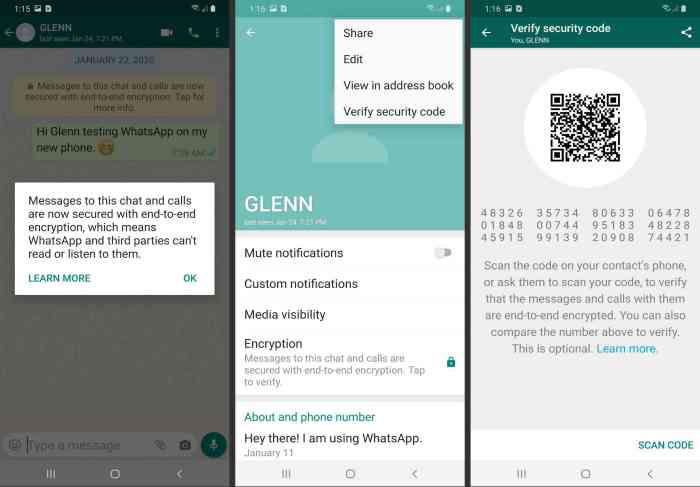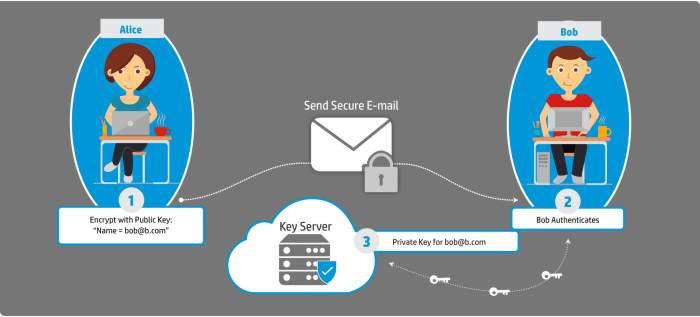Is WhatsApp safe to use? How does its end-to-end encryption work? These are questions that have been on the minds of many users as they navigate the complexities of online communication. In this comprehensive guide, we’ll delve into the intricacies of WhatsApp’s security measures, exploring the inner workings of end-to-end encryption and providing practical tips to ensure your privacy and data protection.
WhatsApp has become an indispensable tool for communication, boasting over 2 billion active users worldwide. Its popularity stems from its ease of use, cross-platform compatibility, and robust security features. However, with the increasing prevalence of cyber threats, it’s essential to understand the security implications of using WhatsApp and how to mitigate potential risks.
WhatsApp’s End-to-End Encryption: Is WhatsApp Safe To Use? How Does Its End-to-end Encryption Work?
WhatsApp utilizes end-to-end encryption, ensuring that only the sender and recipient can access message content. This is achieved through the implementation of robust cryptographic algorithms and a secure key exchange mechanism.
Encryption Algorithm, Is WhatsApp safe to use? How does its end-to-end encryption work?
WhatsApp employs the Signal Protocol, a combination of algorithms that includes the AES-256 cipher for encrypting message content, the HMAC-SHA256 algorithm for message authentication, and the Diffie-Hellman key exchange for establishing a shared secret between sender and recipient.
Key Exchange Process
The key exchange process in WhatsApp is based on the Diffie-Hellman protocol. When two users communicate for the first time, their devices generate a unique pair of public and private keys. These keys are then exchanged over a secure channel, allowing both devices to derive a shared secret key.
This shared key is used to encrypt and decrypt all subsequent messages exchanged between the two users, ensuring that only they can access the message content.
Security Features of WhatsApp

Beyond end-to-end encryption, WhatsApp has implemented various additional security features to enhance the overall protection of its platform.
These measures include:
Two-Factor Authentication
WhatsApp offers two-factor authentication as an optional security layer. This feature requires users to provide a six-digit verification code, in addition to their password, when logging into their WhatsApp account on a new device. This helps prevent unauthorized access, even if someone obtains the user’s password.
Strong Password Encouragement
WhatsApp encourages users to create strong passwords that are at least 8 characters long and include a combination of uppercase and lowercase letters, numbers, and symbols. Strong passwords make it more difficult for attackers to guess or crack, providing an additional layer of protection.
Security Notifications
WhatsApp sends security notifications to users whenever there is a change in their account’s security settings, such as a new device being linked. These notifications help users stay informed about any potential security breaches and take appropriate action if necessary.
WhatsApp’s commitment to end-to-end encryption has raised concerns about its safety, but it’s important to note that the company is constantly working to improve its security measures. As we explore the potential risks associated with using WhatsApp, it’s also worth considering the company’s stance on third-party chats.
WhatsApp’s recent announcement on this matter suggests that the company is taking steps to address concerns while maintaining the privacy and security of its users. By understanding WhatsApp’s approach to both end-to-end encryption and third-party chats, we can make informed decisions about the safety and suitability of the platform.
Biometric Authentication
WhatsApp supports biometric authentication, such as fingerprint or facial recognition, for unlocking the app. This provides an additional layer of security, as users can access their WhatsApp account without entering their password every time they open the app.
Regular Security Updates
WhatsApp regularly releases security updates to address any vulnerabilities or security flaws in the app. These updates are essential for maintaining the platform’s security and protecting user data.
Potential Security Concerns

While WhatsApp implements end-to-end encryption, it is not immune to potential security concerns. Understanding these vulnerabilities is crucial for users to make informed decisions about their online safety and privacy.
One concern is the potential for data breaches. WhatsApp stores metadata about users, including their phone numbers, contacts, and message timestamps. If this data is compromised, it could provide valuable information to attackers. Additionally, WhatsApp relies on third-party cloud services, such as Google Drive and iCloud, for backups.
If these services are breached, user data could be exposed.
Vulnerabilities of End-to-End Encryption
- Man-in-the-Middle Attacks:Attackers may intercept messages before they are encrypted or after they are decrypted, potentially compromising the communication.
- Metadata Collection:WhatsApp collects metadata about user activities, such as message timestamps and recipient information. This data can be used to infer patterns and potentially identify users.
- Phishing and Social Engineering:Attackers may use phishing techniques or social engineering to trick users into revealing their login credentials or sensitive information.
Risks of Sharing Sensitive Information
Sharing sensitive information over WhatsApp poses risks that users should be aware of. Sensitive information includes personal data, financial information, or confidential business documents. If this information is intercepted or accessed by unauthorized parties, it could lead to identity theft, financial loss, or other security breaches.
Recommendations for Mitigating Risks
- Use Strong Passwords:Create complex passwords for your WhatsApp account and enable two-factor authentication for added security.
- Be Cautious of Phishing and Social Engineering:Avoid clicking on suspicious links or sharing personal information with unknown contacts.
- Limit the Sharing of Sensitive Information:Only share sensitive information over WhatsApp if absolutely necessary and consider using other secure communication channels for highly confidential data.
- Use Third-Party Encryption Tools:Consider using third-party encryption tools to enhance the security of your messages beyond WhatsApp’s end-to-end encryption.
Comparison with Other Messaging Apps
WhatsApp’s security features compare favorably to other popular messaging applications. However, each app has its own strengths and weaknesses.
Encryption and Security Measures
- WhatsApp:End-to-end encryption for all messages, voice calls, and video calls. Open-source Signal Protocol.
- Telegram:End-to-end encryption for secret chats only. Custom MTProto protocol.
- Signal:End-to-end encryption for all messages, voice calls, and video calls. Open-source Signal Protocol.
- iMessage:End-to-end encryption for messages sent between Apple devices. Custom protocol.
- Facebook Messenger:End-to-end encryption for secret conversations only. Custom protocol.
Strengths and Weaknesses
- WhatsApp:Widely used, user-friendly interface, strong encryption.
- Telegram:Feature-rich, allows for large group chats, weaker encryption for non-secret chats.
- Signal:Strongest encryption, open-source code, less user-friendly interface.
- iMessage:Limited to Apple devices, strong encryption for Apple-to-Apple communication.
- Facebook Messenger:Owned by Meta, end-to-end encryption not enabled by default.
Factors to Consider
- Privacy concerns:Consider the app’s encryption strength and data collection policies.
- Security needs:Assess the level of security required for your communications.
- User-friendliness:Choose an app with an interface that meets your needs.
- Cross-platform compatibility:Ensure the app is available on the devices you use.
- Reputation and trustworthiness:Research the app’s reputation and the company behind it.
WhatsApp’s Privacy Policy
WhatsApp’s privacy policy Artikels the data it collects, how it uses that data, and with whom it shares it. The policy has been criticized by some for being too broad and for allowing WhatsApp to share user data with its parent company, Facebook.
Data Collection
- WhatsApp collects a variety of data from its users, including phone numbers, contacts, usage data, and location data.
- This data is used to provide the service, improve the user experience, and for marketing purposes.
Data Sharing
- WhatsApp shares user data with its parent company, Facebook, and with other third parties, such as advertisers and data brokers.
- This data is used for a variety of purposes, including targeted advertising, market research, and product development.
Implications for Users
- WhatsApp’s privacy policy has a number of implications for users, including:
- Users should be aware that WhatsApp collects and shares a significant amount of their personal data.
- Users should be careful about what information they share on WhatsApp, as it may be shared with third parties.
- Users should consider using a different messaging app if they are concerned about their privacy.
User Education and Awareness

User education and awareness play a pivotal role in maintaining WhatsApp security. WhatsApp users must be cognizant of the potential security risks and best practices to protect their privacy and data.
Tips for Users
- Enable end-to-end encryption for all chats.
- Use two-factor authentication to add an extra layer of security.
- Avoid sharing personal information, such as your phone number or address, with unknown contacts.
- Be cautious of suspicious links or attachments.
- Report any suspicious activity or security concerns to WhatsApp.
WhatsApp’s Role
WhatsApp actively educates users about online safety and security through its Help Center, blog posts, and in-app notifications. The platform also provides clear and concise privacy settings to empower users to control their data. By fostering user awareness, WhatsApp empowers individuals to make informed decisions and protect their online presence.
Ultimate Conclusion
In conclusion, WhatsApp’s end-to-end encryption provides a high level of security for user communications. By understanding the inner workings of this technology and implementing additional security measures, you can confidently use WhatsApp to connect with friends, family, and colleagues while safeguarding your privacy and protecting your data from prying eyes.
Remember, online safety is a shared responsibility. By staying informed about the latest security threats, using strong passwords, and reporting suspicious activity, you can contribute to a safer and more secure online environment for all.
General Inquiries
Is WhatsApp’s end-to-end encryption truly unbreakable?
While WhatsApp’s end-to-end encryption is robust, it’s important to note that no encryption method is completely unbreakable. However, the level of encryption employed by WhatsApp makes it extremely difficult for third parties to intercept and decipher messages.
Can WhatsApp read my messages?
No, WhatsApp cannot read your messages due to the implementation of end-to-end encryption. The encryption process ensures that only the sender and recipient can access the content of messages.
What are the potential security risks associated with using WhatsApp?
Potential security risks include phishing scams, malware attacks, and unauthorized access to your account. It’s important to be cautious when clicking on links or downloading files from unknown sources, and to enable two-factor authentication for added protection.
